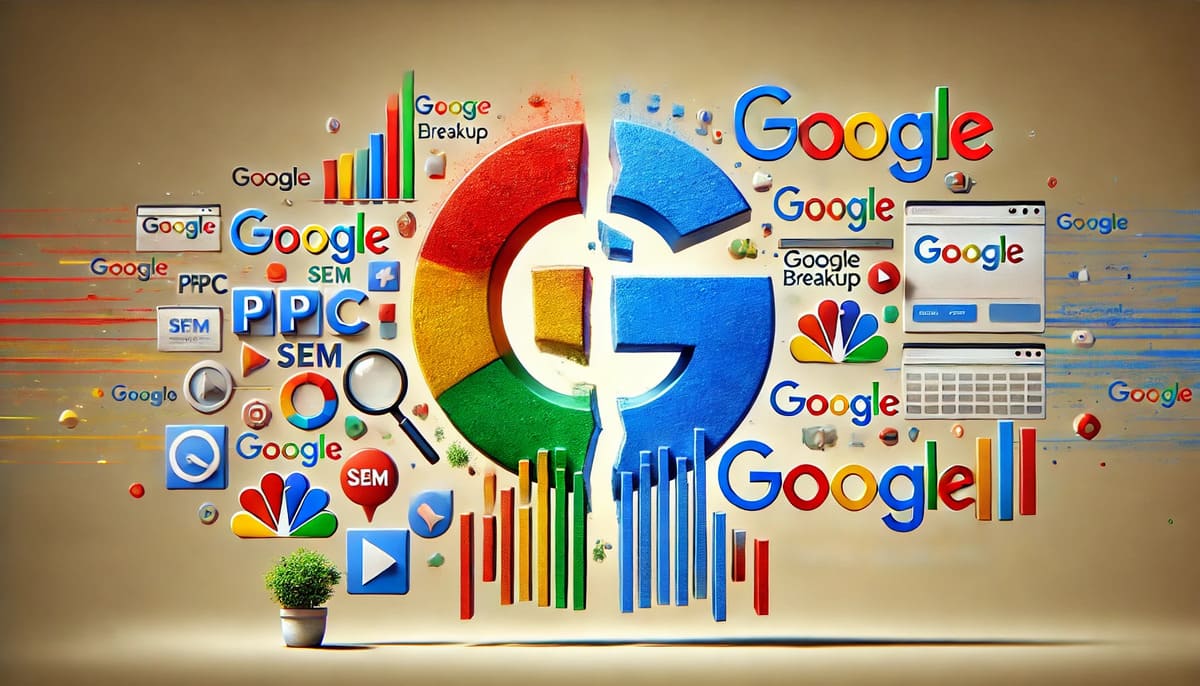How a Google Breakup Could Reshape the PPC Industry and Digital Advertising Landscape

As Google faces potential antitrust action, a breakup could bring big changes to the PPC industry. This article explores what a split might mean for advertisers, small businesses, and the future of digital marketing.
What a Google Breakup Could Mean for the Future of PPC and Search Advertising
30-Second Summary:
Google’s dominance in digital advertising is under antitrust scrutiny, raising the question: how would a breakup impact the PPC and search advertising industry? A split could bring new competitors, create opportunities for small businesses, and lower ad costs—but it may also introduce challenges for companies relying on Google’s tools. This post breaks down potential changes, benefits, and drawbacks for advertisers in a post-Google-breakup world.
Exploring the Impact of a Potential Google Breakup on the PPC Industry
Google has long been a powerhouse in digital advertising, especially within the PPC (pay-per-click) and search advertising space. But as antitrust investigations intensify, the possibility of a Google breakup is becoming more realistic. This potential split could transform the way digital marketing operates, influencing everyone from large corporations to small businesses and individual advertisers. In this article, we’ll explore how a Google breakup could reshape the PPC industry and the broader digital advertising ecosystem.
Imagine a world where Google no longer controls 90% of the search advertising market. This reality could be on the horizon, as lawmakers push for greater competition in digital advertising. For advertisers and marketers, such a change could bring both exciting opportunities and new challenges. Here’s a closer look at how this potential shift could impact PPC advertising, and what it could mean for the future of digital marketing.
Google’s Dominance and the Current PPC Landscape
Today, Google dominates the PPC industry, with a vast ecosystem of tools like Google Ads, Analytics, and Tag Manager. This monopoly allows Google to offer integrated services, but it also limits competition and choice for advertisers. A Google breakup could dismantle this one-stop-shop model, potentially lowering ad prices and inviting more players into the market.
- Current State: Google’s market control impacts everything from ad placement costs to data availability, making it challenging for smaller platforms to compete.
- Implications of Change: A breakup would decentralize these resources, potentially giving rise to alternative platforms and more innovative advertising solutions.
The Benefits of a Google Breakup for Advertisers
For many in the digital marketing space, a Google breakup could present a range of advantages. Increased competition could lead to better options for advertisers and potentially more affordable PPC rates.
- Greater Competition: New platforms and companies may emerge, pushing Google to innovate and reduce ad costs.
- Innovation in Niche Markets: Smaller companies might focus on specialized advertising solutions, creating opportunities for more targeted, creative campaigns.
- Access to Alternative Platforms: Advertisers would have the flexibility to diversify their PPC strategies across multiple providers, enhancing the reach and effectiveness of campaigns.
Potential Challenges for Small Businesses
While increased competition and lower costs could benefit advertisers, a Google breakup may also bring challenges, especially for small businesses that rely on Google’s integrated tools.
- Loss of Unified Tools: Google’s one-stop-shop setup simplifies campaign management. Without it, marketers may need to juggle multiple platforms, which could increase complexity.
- Increased Costs for Tools: Smaller businesses that previously relied on Google’s free or affordable tools may face higher costs if they’re forced to use multiple providers.
- Learning Curve: Adapting to new platforms and tools could create a steep learning curve, especially for small business owners with limited technical expertise.
How a Google Breakup Could Reshape Search Engine Marketing (SEM)
A Google breakup would not only affect PPC but also bring changes to SEM. With multiple search engines gaining prominence, SEM strategies would need to diversify, optimizing for new platforms.
- Platform-Specific Optimization: Advertisers may need to tailor SEM strategies to specific platforms as competitors like Bing, Yahoo, or newer entrants capture market share.
- Greater Emphasis on Organic Reach: With PPC costs potentially shifting, businesses might focus more on organic SEO to balance paid ad expenses.
- Expansion of Targeting Options: Different platforms could offer unique targeting features, allowing for more varied and niche audience reach.
Common Pain Points
The potential breakup of Google highlights several pain points in today’s PPC landscape and brings forward both positives and negatives for advertisers:
- High Dependence on Google: Many small businesses rely heavily on Google’s ecosystem, and a breakup could make campaign management more complex.
- Learning Curve: Switching between multiple ad platforms could be daunting for businesses that are used to Google’s integrated tools.
- Cost Shifts: While a breakup could reduce ad costs overall, transitioning to multiple platforms could create initial expenses for training and setup.
For advertisers, a Google breakup offers a chance to diversify strategies and potentially lower costs. More competition means innovation and a focus on quality and choice, providing more value to both advertisers and consumers.
Did You Know?
Google handles about 92% of global search traffic. A breakup could redistribute this search volume, creating new opportunities for smaller search engines to gain market share.
While a Google breakup may seem disruptive, it could ultimately benefit the PPC and digital marketing industries by encouraging competition, lowering costs, and giving advertisers more choices. However, for small businesses reliant on Google’s all-in-one ecosystem, a breakup could bring challenges, from managing multiple platforms to facing new costs. Understanding these potential shifts is essential for any business that wants to stay competitive in a rapidly changing digital landscape.
Google’s potential breakup could bring major changes to the PPC and search advertising industry. While increased competition and lower ad costs may benefit advertisers, there could also be challenges for small businesses. This post explores how a Google breakup might impact advertisers and the future of digital marketing.
Takeaway:
A Google breakup could be a transformative moment for digital advertising, introducing both opportunities and challenges. For advertisers, understanding these potential shifts can help in preparing for a future where Google is no longer the sole dominant player in PPC.



